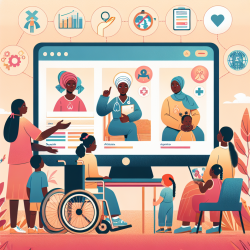Introduction
As speech-language pathologists (SLPs) dedicated to fostering optimal communication outcomes for children, it is crucial to integrate evidence-based practices into our therapeutic approaches. A recent scoping review titled "Health Effects of Pesticide Exposure in Latin American and the Caribbean Populations" provides valuable insights that can be leveraged to enhance our practice, particularly when working with children from agricultural communities. This blog will explore how the findings from this research can inform our clinical decision-making and encourage further research to address existing gaps.
Understanding the Research
The scoping review conducted by Zúñiga-Venegas et al. (2022) highlights the adverse health effects associated with pesticide exposure in Latin American and Caribbean populations. The review identifies several health outcomes, including neurobehavioral deficits, genotoxicity, and reproductive issues, with children and farmworkers being particularly vulnerable. Given the prevalence of agricultural activities in these regions, the findings underscore the need for targeted interventions to mitigate the impact of pesticide exposure on children's health and development.
Implications for Speech-Language Pathology
Neurobehavioral Outcomes: The review reveals consistent evidence of neurobehavioral impairments in children exposed to pesticides, including deficits in cognition, memory, and attention. As SLPs, we must be vigilant in assessing these areas during evaluations and tailor our interventions to address specific cognitive-linguistic challenges. Incorporating strategies that enhance executive functioning and working memory can be beneficial for children from agricultural backgrounds.
Collaboration with Schools and Communities: Given the potential impact of pesticide exposure on children's communication development, collaboration with schools and communities is essential. SLPs can play a pivotal role in advocating for environmental health initiatives and educational programs that raise awareness about the risks of pesticide exposure. By working closely with educators and community leaders, we can develop comprehensive support systems that address the unique needs of children in agricultural settings.
Data-Driven Decision Making: The research highlights the importance of using data-driven approaches to assess and address the effects of pesticide exposure. SLPs should incorporate standardized assessment tools and evidence-based interventions to monitor progress and evaluate the effectiveness of therapeutic strategies. By leveraging data, we can make informed decisions that enhance the quality of care provided to our clients.
Encouraging Further Research
The scoping review identifies several knowledge gaps and methodological limitations in the existing literature. To advance our understanding of the impact of pesticide exposure on children's communication development, further research is needed in the following areas:
- Longitudinal studies that examine the long-term effects of pesticide exposure on neurodevelopmental outcomes.
- Research that explores the efficacy of specific therapeutic interventions in mitigating the impact of pesticide exposure on communication skills.
- Studies that investigate the role of socio-economic and environmental factors in moderating the effects of pesticide exposure on children's health.
Conclusion
Integrating the findings from the scoping review into our practice as speech-language pathologists can enhance our ability to support children from agricultural communities effectively. By prioritizing data-driven decision-making and advocating for collaborative initiatives, we can contribute to improved health outcomes for children affected by pesticide exposure. Continued research in this area is essential to develop targeted interventions that address the unique challenges faced by these populations.
To read the original research paper, please follow this link: Health Effects of Pesticide Exposure in Latin American and the Caribbean Populations: A Scoping Review.










